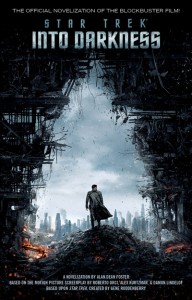Bookworms Star Trek Into Darkness (2013) by Alan Dean Foster
“The universe will unfold as it should. – Spock, Star Trek VI: The Undiscovered Country
A few years ago, Ambassador Spock tried to avert galactic disaster, and in the process, found himself once again at the beginning of human galactic exploration. Star Trek, a “reboot” of the hugely successful science fiction franchise was destined to be sequeled. This year director J.J. Abrams gave the world that sequel: Star Trek Into Darkness. Earlier this year I reviewed the novelization of the first film (you can find that here) by Alan Dean Foster and found that it not only captured the fun and vitality of the film, it added to and expanded on the story.
Foster returns to the world of Star Trek, no doubt following the screenplay, but this time around fails to enrich the story. Reading the Into Darkness novel is exactly like watching the film, but with words. There are no extra scenes, no added character thoughts, no extra description or expansion. In my opinion, for a novelization to be successful, it needs these things. Scenes are deleted from movies because they disturb the pacing, or the mood, or simply make the running time longer than a producer or film studio wants it to be. Novels do not bow to the same restrictions. I know that Into Darkness must have had material that didn’t make it into the final cut. Why that was not in the book, I don’t know. There are any number of explanations, but I believe the narrative suffers. I want the in-between bits. The other advantage to a novel is space to get into the characters’ heads. Actors convey mental activity through action. They cannot speak a character’s thoughts and so must be demonstrative. An author does not have the benefit of a visual medium, and thus to counter the lack of body language and expression, they usually include inner monologues or glimpses of thoughts to communicate more about the character. If a novelization does anything beyond reproducing a film in book form, it usually does this. Into Darkness the Book lacked internal worldview.
As Foster did such a great job on the first Star Trek novelization, I am at a loss to explain his mediocre job on this one. In any case, I can let him off the hook for the story’s problems. Those lie with film writers Roberto Orci, Alex Kurtzman, and Damon Lindelof. As the film has been reviewed thoroughly by fellow NerdSpan contributors Michelle Ealey, Dave Howlett, and Ian McNally, I won’t critique it too much, if merely to avoid redundancy. Seriously, read their reviews, they are worth reading.
Briefly, I will mention that a reboot of Star Trek II: The Wrath of Khan was completely the wrong move. The whole point of the rebooted storyline was that new things could happen that hadn’t happened before. Rehashing (at least for the final third of the story) the most highly regarded chapter of Star Trek history is a huge mistake. Go somewhere new, do something different. Or, if you must recycle, recycle something that most people didn’t notice. After all, that was the brilliance of the original Khan film: it took a villain who appeared in exactly one episode of the original trilogy fifteen years earlier. Why not similarly mine the original series for a new villain or storyline? Secondly, Wrath of Khan happened, chronologically, fifteen years after the original encounter with Khan. The crew had fifteen years in which to grow together, to trust each other, and to be ripped to shreds by an old nemesis. Darkness cultivated none of that. In fact, the opening tension revolves around how much Spock and Kirk don’t trust each other while much of Wrath is possible only because they trust each other so completely.
Despite all of that, the novelization of Darkness got one thing right: Khan, freed of Cumberbatch’s persona, was Indian again. Benedict Cumberbatch is a fantastic actor and a terrific villain, however, his one problem is one of genetics (ironically): he is British. Khan, as a character, is Indian (as in the subcontinent). I love the reinterpretation of all the main Star Trek crew, but Sulu stayed Asian, Chekov stayed Russian, Uhura stayed African, and Scotty stayed Scottish. That was the charm of the old show: the racial diversity. Into that mix was thrown an Indian superman. Why he was made British for the film, I don’t know, but I think it lessened the character. Fortunately, in the book, there is no reason not to imagine him as he should be: Indian and devastatingly devious as Khan was actually written fairly well for Into Darkness, and thus inhabits Foster’s novelization with the same menace.
Also, I know I ranted a bit about a lack of “extras” in the novel, but I credit Foster with adding (or retaining) the science that is supposed to be the bedrock of Star Trek. It always was and should be science in its fiction. Sadly, Abrams and his team have stripped much of that out of his films. Foster put it back in. There is technobabble, a bit of actual science, and some nerdiness to be glimpsed in Foster’s prose. Not much, but vastly more than was in the film. As a science geek, a Star Trek fan, and a purist, I appreciated that.
Ultimately, the novel Into Darkness makes as little sense, and carries as little real feeling, as does it’s progenitor the film. Still, I do sometimes prefer to read a movie, and for that the novel works as it should. It is easier to take in during a daily bus or subway commute anyway and a book’s batteries don’t drain.




